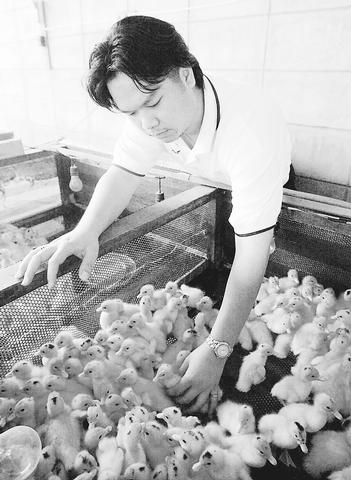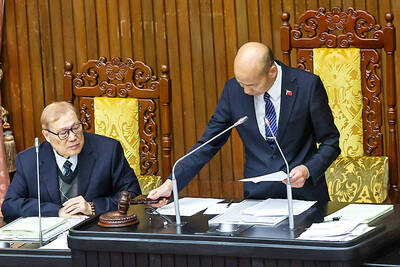Melts-in-the-mouth foie gras from a World War II tropical hellhole? Mascarpone cheese churned near the stalking grounds of tigers? Maybe a glass of white wine -- Chateau de Loei -- from hillsides where tribals planted fields of opium?
Voila! The table is being set for a meal that most Western gourmets would savor. And it's all made-in-Thailand, far better known worldwide for fiery curries and pungent soups.

PHOTO: AP
Globalization, entrepreneurial spirit, changing local tastes and an economic crisis, it adds up to Thais rearing and growing "exotic" produce for domestic consumption and even export.
"I love to introduce and support foreign products made in Thailand, to get the word out and have people talk about it," says Pongtawat Chalermkittichai, executive chef of Bangkok's five-star Regent Hotel. He thereby also prunes his costs.
For example, Pongtawat pays 2,300 baht a kilogram (US$53.40) for foie gras, the rich liver of duck or goose, imported from France. But now about half his stock comes from Chateau Interfarm, Southeast Asia's only foie gras producer. That costs 1,550 baht a kilogram.
Local sourcing like this enjoyed a big boost following the 1997 economic crisis, when devaluation of the Thai baht hiked prices of foreign goods, some of which are subject to high import duties. The Thai palate is also a factor.
When he returned from apprenticeships in London and Sydney eight years ago, few Thais were ordering the Regent's now popular pan fried foie gras with port wine or strong-flavored cheeses, Pongtawat says. Wine drinking was still relatively new.
Spotting the trend, construction tycoon Chaiyudh Karnasuta imported vines along with expertise from France and began planting the hillsides of Loei Province in northeastern Thailand.
"Light and undeniably fruity, yet able-bodied and not at all sweet. Not a great wine, but a good one," opined a Time magazine tasting. Good enough, however, to be served at a 1996 conference of Asian and European heads of state and other official functions.
Chaiyudh, whose enterprise yearly corks 500,000 bottles, predicts Thailand will be producing 10 million bottles by decade's end. Prospects are likewise favorable for comestibles like pheasant, frogs and snails for French cuisine, venison from imported Chital deer and decidedly untropical items such as strawberries and Brussels sprouts.
On the grasslands adjoining Khao Yai, an extensive wildlife park, a budding dairy industry is producing one foodstuff traditionally regarded too smelly to stomach. Ricotta, mascrapone and cream cheeses are ordered by Bangkok's fancy restaurants while Thai-made mozzarella tops now popular fast food pizzas.
On the slopes of the country's highest mountain, Doi Inthanon, Thailand's innovative King Bhumibol Adulyadej has initiated a rainbow trout farm, utilizing fresh water cascading from the heights. Most of the workers are hilltribes people who might otherwise scrabble for a living.
The Regent chef, whose mother peddled curries on Bangkok streets, says New Zealand trout still has the taste edge but the hotel's Thai breaded trout fillet with a light garlic sauce garnished with organic vegetables from northern Thailand is a winner.
The main problem, he says, with these niche foods is not so much taste but insufficient, and sometimes, erratic local supply.
Chateau Interfarm owner Sunthorn Ritviwat says he can only supply some 500kg of foie gras each month -- not enough for the Bangkok market.
But he's planning to increase output and improve quality on his sprawling farm, located near where thousands of Allied prisoners-of-war died at the hands of their Japanese captors while building a railway and bridge over the River Kwai.
A gourmet's heaven, a hell for animal welfare activists, Interfarm pens up 936 ducks in each of three concrete buildings where corn is stuffed down their throats via a metal pipe over 14 to 18 days of force-feeding. This balloons their livers to about four times the normal size.
The only luxury they enjoy is a pleasant temperature. Unlike France, where ducks may have to be sheltered from the cold, those in Thailand need air conditioning for protection against blistering heat.
"It should melt in your mouth like ice cream," enthuses Sunthorn, admitting not all his livers yet emerge with the goldenish color, soft texture and generous size of the perfect foie gras.
An agro-business veteran, Sunthorn took over the farm in 1997, seeking technical assistance as well as ducks from Grimaud Freres, a leading French poultry firm.
The farm was started five years earlier but went through two sets of French, Canadian and Thai owners. According to Sunthorn, the whole thing turned into a Gallic farce, with family quarrels, business bickering and one of the Frenchmen jailed for starting a side business -- growing marijuana.
"They fought before making foie gras," Sunthorn says.

DEFENDING DEMOCRACY: Taiwan shares the same values as those that fought in WWII, and nations must unite to halt the expansion of a new authoritarian bloc, Lai said The government yesterday held a commemoration ceremony for Victory in Europe (V-E) Day, joining the rest of the world for the first time to mark the anniversary of the end of World War II in Europe. Taiwan honoring V-E Day signifies “our growing connections with the international community,” President William Lai (賴清德) said at a reception in Taipei on the 80th anniversary of V-E Day. One of the major lessons of World War II is that “authoritarianism and aggression lead only to slaughter, tragedy and greater inequality,” Lai said. Even more importantly, the war also taught people that “those who cherish peace cannot

STEADFAST FRIEND: The bills encourage increased Taiwan-US engagement and address China’s distortion of UN Resolution 2758 to isolate Taiwan internationally The Presidential Office yesterday thanked the US House of Representatives for unanimously passing two Taiwan-related bills highlighting its solid support for Taiwan’s democracy and global participation, and for deepening bilateral relations. One of the bills, the Taiwan Assurance Implementation Act, requires the US Department of State to periodically review its guidelines for engagement with Taiwan, and report to the US Congress on the guidelines and plans to lift self-imposed limitations on US-Taiwan engagement. The other bill is the Taiwan International Solidarity Act, which clarifies that UN Resolution 2758 does not address the issue of the representation of Taiwan or its people in

The Philippines yesterday criticized a “high-risk” maneuver by a Chinese vessel near the disputed Scarborough Shoal (Huangyan Island, 黃岩島) in a rare incident involving warships from the two navies. The Scarborough Shoal — a triangular chain of reefs and rocks in the contested South China Sea — has been a flash point between the countries since China seized it from the Philippines in 2012. Taiwan also claims the shoal. Monday’s encounter took place approximately 11.8 nautical miles (22km) southeast” of the Scarborough Shoal, the Philippine military said, during ongoing US-Philippine military exercises that Beijing has criticized as destabilizing. “The Chinese frigate BN 554 was

LEISURE: The new law adds Confucius’ birthday, the anniversary of the Battle of Guningtou, Constitution Day and Little New Year as national holidays The Legislative Yuan yesterday passed new legislation adding four national holidays and making Workers’ Day a national holiday for all sectors. The Chinese Nationalist Party (KMT) and the Taiwan People’s Party used their combined majority in the legislature to push the jointly proposed draft through its third and final reading. This new law supersedes the existing regulations for the implementation of memorial days and state holidays, which are administered by the Ministry of the Interior. The new law recognizes Confucius’ birthday on Sept. 28, the anniversary of the Battle of Guningtou on Oct. 25, Constitution Day on Dec. 25 and “Little New Year,”